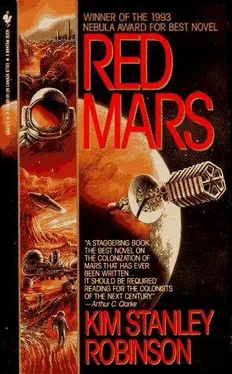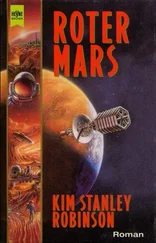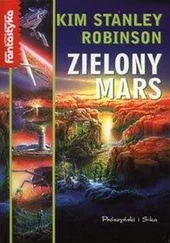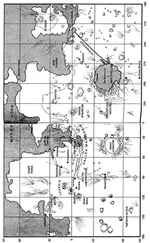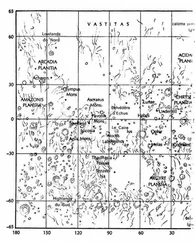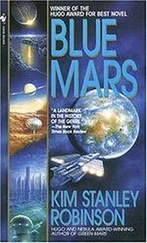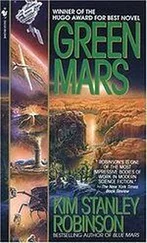A line of masked celebrants snaked down the boulevard, drunk, loose, at the edge of control. At an intersection the boulevard opened up into a small plaza, where a fountain shot sun-colored water into the air. Around the fountain a steel-drum band hammered out a calypso tune. People gathered around, dancing or hopping in time to the low bong of the bass drum. A hundred meters overhead a vent in the tent frame poured frigid air down onto the plaza, air so cold that little flakes of snow floated in it, glinting in the light like chips of mica. Then fireworks banged just under the tenting, and colored sparks fell down through the snowflakes.
• • •
It always seemed to him that sunset more than any other time of day made it clear that they stood on an alien planet; something in the slant and redness of the light was fundamentally wrong, upsetting expectations wired into the savannah brain over millions of years. This evening was providing a particularly garish and unsettling example of the phenomenon. Frank wandered in its light, making his way back to the city wall. The plain south of the city was littered with a truly Martian abundance of rocks, each one dogged by a long black shadow. Under the concrete arch of the city’s south gate he stopped. No one there. The gates were locked during festivals like these, to keep drunks from going out and getting hurt. But Frank had gotten the day’s emergency code out of the fire department AI that morning, and when he was sure no one was watching he tapped out the code and hurried into the lock. He put on a walker, boots, and helmet, and went through the middle and outer doors.
Outside it was intensely cold as always, and the diamond pattern of the walker’s heating element burned through his clothes. He crunched over concrete and then duricrust. Loose sand flowed east, pushed by the wind.
Grimly he looked around. Rocks everywhere. A planet sledgehammered billions of times. And meteors still falling. Someday one of the towns would take a hit. He turned and looked back. It looked like an aquarium glowing in the dusk. There would be no warning, but everything would suddenly fly apart, walls, vehicles, trees, bodies. The Aztecs had believed the world would end in one of four ways: earthquake, fire, flood, or jaguars falling from the sky. Here there would be no fire. Nor earthquake nor flood, now that he thought of it. Leaving only the jaguars.
The twilight sky was a dark pink over Pavonis Mons. To the east stretched Nicosia’s farm, a long low greenhouse running downslope from the city. From this angle one could see that the farm was larger than the town proper, and jammed with green crops. Frank clumped to one of its outer locks, and entered.
Inside the farm it was hot, a full sixty degrees warmer than outside, and fifteen degrees warmer than in the city. He had to keep his helmet on, as the farm air was tailored to the plants, heavy on CO2 and short on oxygen. He stopped at a work station and fingered through drawers of small tools and pesticide patches, gloves and bags. He selected three tiny patches and put them in a plastic bag, then slipped the bag gently into the walker’s pocket. The patches were clever pesticides, biosaboteurs designed to provide plants with systemic defenses; he had been reading about them, and knew of a combination that in animals would be deadly to the organism. .
He put a pair of shears in the walker’s other pocket. Narrow gravel paths led him up between long beds of barley and wheat, back toward the city proper. He went in the lock leading into town, unclipped his helmet, stripped off the walker and boots, transferred the contents of the walker pockets to his coat. Then he went back into the lower end of town.
Here the Arabs had built a medina, insisting that such a neighborhood was crucial to a city’s health; the boulevards narrowed, and between them lay warrens of twisted alleyways taken from the maps of Tunis or Algiers, or generated randomly. Nowhere could you see from one boulevard to the next, and the sky overhead was visible only in plum strips, between buildings that leaned together.
Most of the alleys were empty now, as the party was uptown. A pair of cats skulked between buildings, investigating their new home. Frank took the shears from his pocket and scratched into a few plastic windows, in Arabic lettering, Jew, Jew, Jew, Jew, Jew . He walked on, whistling through his teeth. Corner cafés were little caves of light. Bottles clinked like prospectors’ hammers. An Arab sat on a squat black speaker, playing an electric guitar.
He found the central boulevard, walked up it. Boys in the branches of the lindens and sycamores shouted songs to each other in Schwyzerdüütsch. One ditty was in English: “John Boone/Went to the moon/No fast cars/He went to Mars!” Small disorganized music bands barged through the thickening crowd. Some moustached men dressed as American cheerleaders flounced expertly through a complicated can-can routine. Kids banged little plastic drums. It was loud; the tenting absorbed sound, so there weren’t the echoes one heard under crater domes, but it was loud nevertheless.
Up there, where the boulevard opened into the sycamore park— that was John himself, surrounded by a small crowd. He saw Chalmers approaching and waved, recognizing him despite the mask. That was how the first hundred knew each other. .
“Hey, Frank,” he said. “You look like you’re having a good time.”
“I am,” Frank said through his mask. “I love cities like this, don’t you? A mixed-species flock. It shows you what a diverse collection of cultures Mars is.”
John’s smile was easy. His eyes shifted as he surveyed the boulevard below.
Sharply Frank said, “A place like this is a crimp in your plan, isn’t it?”
Boone’s gaze returned to him. The surrounding crowd slipped away, sensing the agonistic nature of the exchange. Boone said to Frank, “I don’t have a plan.”
“Oh come on! What about your speech?”
Boone shrugged. “Maya wrote it.”
A double lie: that Maya wrote it, that John didn’t believe it. Probably. Even after all these years it was almost like talking to a stranger. To a politician at work. “Come on, John,” Frank snapped. “You believe all that and you know it. But what are you going to do with all these different nationalities? All the ethnic hatreds, the religious manias? Your coalition can’t possibly keep a thumb on all this. You can’t keep Mars for yourselves, John, it’s not a scientific station anymore, and you’re not going to get a treaty that makes it one.”
“We’re not trying to.”
“Then why are you trying to cut me out of the talks!”
“I’m not!” John looked injured. “Relax, Frank. We’ll hammer it out together just like we always have. Relax.”
Frank stared at his old friend, nonplussed. What to believe? He had never known how to think of John— the way he had used Frank as a springboard, the way he was so friendly. . hadn’t they begun as allies, as friends?
It occurred to him that John was looking for Maya. “So where is she?”
“Around somewhere,” Boone said shortly.
It had been years since they had been able to talk about Maya. Now Boone gave him a sharp look, as if to say it was none of his business. As if everything of importance to Boone had become, over the years, none of Frank’s business.
Frank left him without a word.
• • •
The sky was now a deep violet, streaked by yellow cirrus clouds. Frank passed two figures wearing white ceramic dominoes, the old Comedy and Tragedy personas, handcuffed together. The city’s streets had gone dark and windows blazed, silhouettes partying in them. Big eyes darted in every blurry mask, looking to find the source of the tension in the air. Under the tidal sloshing of the crowd there was a low tearing sound.
Читать дальше
Конец ознакомительного отрывка
Купить книгу
